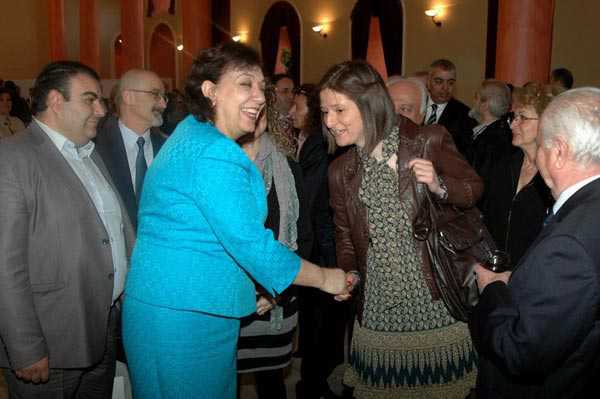Are Turkish-Armenians Diaspora?: Istanbul journalist says Turkey’s Armenians live in their historical lands
ArmeniaNow reporter
Prominent Istanbul-Armenian journalist Vercihan Ziflioglu’s article posted in the Turkish Hurrieyet daily raising the issue of Istanbul Armenians not viewing themselves as Diaspora and criticizing the Armenian Diaspora minister’s visit and attitude, has been qualified as false and “a cheap means of Turkey’s regular propaganda” aimed at “creating an artificial watershed between Armenia and its Diaspora”.

Diaspora Minister Hranush Hakobyan shaking hands with Istanbul-Armenian journalist Vercihan Ziflioglu during the minister’s meeting with the Armenian community in Turkey.
Minister Hranush Hakobyan’s visit to Istanbul earlier in May sparked a debate over the question: who are Istanbul Armenians – Diaspora or not?
In the article, , Istanbul-Armenian intellectuals called the visit a mockery.
In an interview to Vercihan, a famous Istanbul-Armenian writer said, despite the fact that she had received a medal from the minister:
“It could have been any minister from Armenia, but I would not have preferred a Diaspora minister to have come to Turkey. Where I live now is where I have lived for thousands of years; I am no Diaspora. This is a terrible irony,” said Mıgırdiç Margosyan.
However, rather than discussing this issue in Armenia, it was sharply criticised: expert in Turkish studies Ruben Melkonyan said regarding the article by the native Armenian journalist who has been covering minority issues for one of Turkey’s biggest newspapers that “putting it mildly, it does not match the reality”.
Vercihan, 35, who has international recognition for her professionalism and who won the Swedish academy’s Euro-Med Journalist prize for Cultural Dialogue in 2008 and Turkey’s well-known Successful Journalists of 2008 awards by the Contemporary Journalists Association in 2009, believes that many in Armenia do not understand neither do they really know Istanbul-Armenians.
“I prepared that article through interviews – from America to Aleppo, from Istanbul to Canada (prominent people living in different countries share their opinions); I have the audio records, how can they call it a lie?! The article expresses the thoughts of Armenians, and I believe that it came as news to them (Armenia-based Armenians, the Ministry of the Diaspora) whether Istanbul-Armenians are Diaspora or not,” Vercihan told ArmeniaNow and stresses again:
“Constantinople or Polis (as Armenians usually refer to Istanbul) is not Diaspora, and Armenia has to understand that. Moreover, even Armenia can be called Diaspora and the Armenians spread around the world, but never Constantinople Armenians. How can they call Diaspora a land that has nurtured and felt the breath of Charents, Metsarents, Durian?” she says with frustration.
As Vercihan says, although there are lots of specialists in Turkish studies, they have not researched Istanbul-Armenians well enough and fail to present them correctly – for years they, all alone, had to go through many hardships in order to preserve Armenian schools and their identity living in isolation.
“In Armenia wherever you look you can find Turkish studies specialists, but which of them has ever come to Turkey, for how long has lived here, how much communication they have had with Istanbul-Armenians, how well do they know Turkish policies?” asks the journalist and answers her own question with confidence that there are no proper specialists.
People in Armenia often blame Istanbul-Armenians for not acting in favor of Armenians; Hrant Dink was criticised for that reason, when he first came to Armenia.
“It pains me greatly. Once after interviewing a politician from Armenia, I asked him personally what name he uses when talking about Istanbul-Armenians, he looked straight in my eyes and said “we call you Turks”, yes Turks, or Germans; any nationality is fine, but how can they call so 50,000 Armenians who have managed to preserve their identity throughout so much pain and grief and who are still suffering,” says Vercihan, her voice trembling from humiliation.
She feels offended also when even high-ranking officials in Armenia ask why her surname has –oglu ending.
“Now I want to ask! Where is it that you live, Armenia [why are you so isolated from the world], that you ask such a question and haven’t understood until now why -oglu stuck to our surnames, what sense is behind it? I can ask then what sense does Parajanov [outstanding Soviet Armenian film-director] make – why did Parajanyan become Parajanov [-yan is Armenian, whereas –ov is a Russian surname ending]? There are plenty of examples like that,” she says.
Despite all her frustration, Vercihan, unlike many, every year spends her holiday in Armenia, rather than going to one of Turkey’s popular seaside resorts.
“Armenia is my love, perhaps, my only one, but still, what we expect from Armenia is democracy. I wish Armenia were my future, my children’s future – it was my dream, but after witnessing the events of 2008 [March 1-2 post-election clashes], after I saw with my own eyes the blood that was spilt, who is going to return my dreams? That day killed my dream,” says the young reporter, still filled with anxious anticipation of her next visit to Armenia (in September) and a hope to find at least some progress.

Leave a Reply